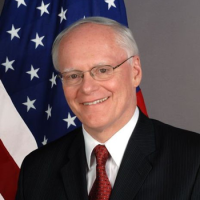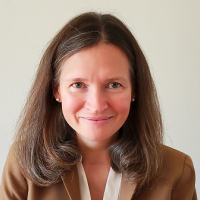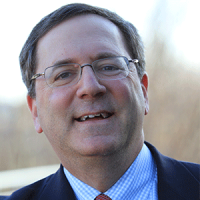The World in Wartimes
Submit a question
Overview
In the context of the ongoing Russian invasion of Ukraine and the Israel-Hamas war, the Wilson Center’s Middle East Program, Kissinger Institute, Global Europe Program, and Kennan Institute hosted a panel that explored the global repercussions of the two wars—and what the implications are for the conflicts themselves as well as for the rest of the world.
In conversation with Distinguished Wilson Center Fellow David Sanger, Robin Wright, Robert Daly, Ambassador James Jeffery, and Jennifer Wistrand provide their expertise on the Middle East, Ukraine, Russia, and China in light of the ongoing conflicts. The panelists examined the deepening split between those who subscribe to the post-WWII global order and those—mainly throughout the Global South—who are interested in creating an order of a different kind. As these global orders are being challenged and reconstituted, the panelists critically examine the leading players and the impacts that their actions will have in the long term.
Broader Impacts of the Wars
Moderator David Sanger outlined at the start that it is vital to consider both the Russian invasion of Ukraine and the Israel-Hamas war in conversation with one another and specifically to focus on the potential long-term impacts of both wars. USIP-Wilson Center Distinguished Fellow Robin Wright explained that the conflicts have activated and may strengthen the Russia-China-Iran relationship and noted the potential impacts that both conflicts will have on the global economy. Deputy Director of the Kennan Institute, Jennifer Wistrand, emphasized that for Putin, the Israel-Hamas war is a positive development as it distracts the United States and other Western powers from supporting Ukraine. Similarly, she argued that the wars are now competing for media attention, noting that “the world’s focus has shifted to Israel and Gaza,” which may further impact Ukraine’s ability to maintain its support from Western powers. Regarding the long-term impacts of both wars, several panelists contended that a new type of Cold War was taking shape.
Post-WWII Order and Global South Split
Several panelists expressed concern that the conflicts and their responses exemplify a challenge to and a shift away from the post-WWII international order. Robin Wright expressed her concern regarding the failure of international institutions, specifically the UN, as she noted that “the UN looks almost irrelevant except for the issue of providing humanitarian aid.” Ambassador Jeffery emphasized Robin’s characterization, presenting that the two ongoing conflicts are “part of an assault by disordered states against the international order.” Jennifer Wistrand also stresses the importance of alliances, noting that the BRICS alliance is growing in number and strength and “could start emphasizing a different set of rules and norms, which could, with time, fracture our international system.” In addressing this, the Director of the Kissinger Institute, Robert Daly, questioned whether countries like those in the BRICS alliance are “really committed to a new set of rules and principles and a new order, or is support for Russia and China designed to provoke the United States?” He argued that the answer to this question has yet to be seen and is one that the U.S. can influence.
The Role of China
Regarding China, Robert Daly highlighted that in the case of both the Russian invasion of Ukraine and the Israel-Hamas war, China’s preference “is to stand aside and to claim to be a neutral peacemaker.” While he stressed that China has greater interests in Russia, he noted that posturing as a neutral peacemaker in both conflicts does not cost China anything and instead allows the country to move closer to Russia and Iran. Robin Wright noted in a similar vein that China’s positioning in the BRICS alliance has allowed Iran to not only join the alliance but also help end the pariah status that the U.S. has worked to maintain. Further, Robert concluded that China is using both the war in Ukraine and the Israel-Hamas war to try to convince the rest of the world “that all of these sources of friction come from one place, which is the hegemony of the United States.”
Speakers



Former ambassador to Iraq and Turkey, and Special Envoy to the Global Coalition To Defeat ISIS

Moderator

White House and National Security Correspondent and Senior Writer, The New York Times.
Hosted By

Middle East Program
The Wilson Center’s Middle East Program serves as a crucial resource for the policymaking community and beyond, providing analyses and research that helps inform US foreign policymaking, stimulates public debate, and expands knowledge about issues in the wider Middle East and North Africa (MENA) region. Read more


Kennan Institute
The Kennan Institute is the premier US center for advanced research on Eurasia and the oldest and largest regional program at the Woodrow Wilson International Center for Scholars. The Kennan Institute is committed to improving American understanding of Russia, Ukraine, Central Asia, the South Caucasus, and the surrounding region through research and exchange. Read more


Kissinger Institute on China and the United States
The Kissinger Institute works to ensure that China policy serves American long-term interests and is founded in understanding of historical and cultural factors in bilateral relations and in accurate assessment of the aspirations of China’s government and people. Read more


Global Europe Program
The Global Europe Program is focused on Europe’s capabilities, and how it engages on critical global issues. We investigate European approaches to critical global issues. We examine Europe’s relations with Russia and Eurasia, China and the Indo-Pacific, the Middle East and Africa. Our initiatives include “Ukraine in Europe”—an examination of what it will take to make Ukraine’s European future a reality. But we also examine the role of NATO, the European Union and the OSCE, Europe’s energy security, transatlantic trade disputes, and challenges to democracy. The Global Europe Program’s staff, scholars-in-residence, and Global Fellows participate in seminars, policy study groups, and international conferences to provide analytical recommendations to policy makers and the media. Read more


